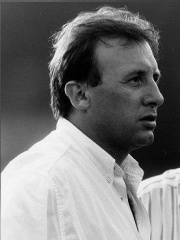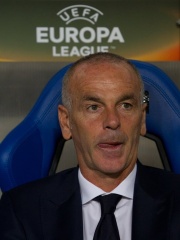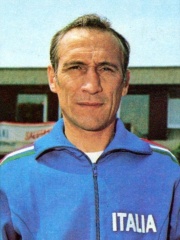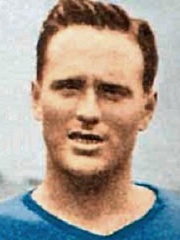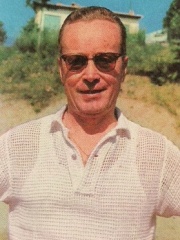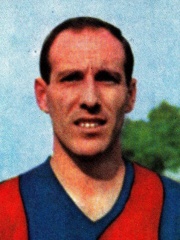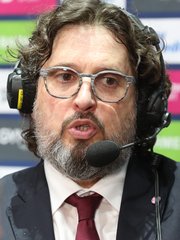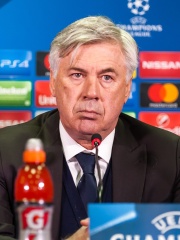
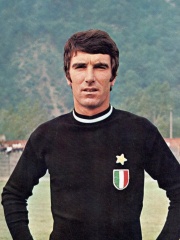
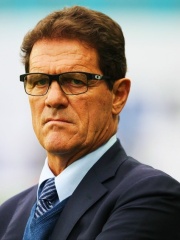
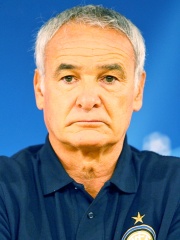
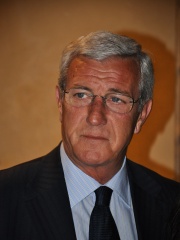
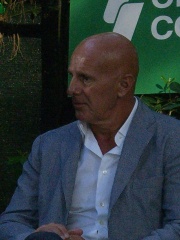
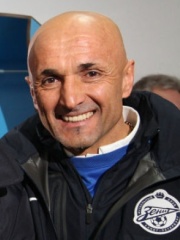
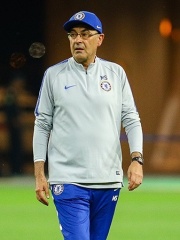
The Most Famous
COACHES from Italy
This page contains a list of the greatest Italian Coaches. The pantheon dataset contains 471 Coaches, 40 of which were born in Italy. This makes Italy the birth place of the 3rd most number of Coaches behind Germany, and United Kingdom.
Top 10
The following people are considered by Pantheon to be the top 10 most legendary Italian Coaches of all time. This list of famous Italian Coaches is sorted by HPI (Historical Popularity Index), a metric that aggregates information on a biography's online popularity. Visit the rankings page to view the entire list of Italian Coaches.

1. Carlo Ancelotti (b. 1959)
With an HPI of 81.23, Carlo Ancelotti is the most famous Italian Coach. His biography has been translated into 78 different languages on wikipedia.
Carlo Ancelotti (Italian pronunciation: [ˈkarlo antʃeˈlɔtti]; born 10 June 1959) is an Italian professional football manager and former player who is the head coach of the Brazil national team. Nicknamed "Carletto" in Italy and "Don Carlo" in Spain, he is regarded as one of the greatest football managers of all time. Ancelotti has won the UEFA Champions League five times, a record for a manager, and is the only manager to take part in six Champions League finals. Ancelotti is also the only manager to win league titles in all of Europe's top five leagues. He has won the FIFA Club World Cup three times and has won the UEFA Super Cup five times, a record for a manager. As a player, Ancelotti won two European Cups with AC Milan in 1989 and 1990, making him one of seven people to have won the European Cup/Champions League as both a player and a manager. He played as a midfielder and began his career with Italian club Parma, helping the club get promoted to Serie B in the 1978–79 season. He moved to Roma the following season, where he won a Serie A title and four Coppa Italia titles. He then played for the late 1980s Milan team and won many titles, including two Scudetti and two European Cups. At international level, he had 26 appearances and one goal for the Italy national team. He represented Italy at two FIFA World Cups and at the UEFA Euro 1988, finishing in third place at the 1990 World Cup and being a semi-finalist at the Euro tournament. As a manager, Ancelotti worked for Reggiana, Parma, and Juventus between 1995 and 2001. He then joined Milan in 2001 and went on to win both the 2002–03 Champions League and 2002–03 Coppa Italia. The following season, he won the Scudetto with an Italian record of 82 points. In 2007, he won his second Champions League with Milan. Ancelotti was awarded the Serie A Coach of the Year twice. He resigned from Milan after the 2008–09 season and was the club's longest-serving manager. In 2009, Ancelotti became the manager of Chelsea and won the domestic double of the Premier League and the FA Cup in his first season. In 2011, he became the manager of Paris Saint-Germain; the following season, he won their first Ligue 1 title in 19 years and was awarded joint Ligue 1 Manager of the Year. Following his success in France, Ancelotti became the manager of Real Madrid. In his first season, he led Real Madrid to their tenth Champions League title and a Copa del Rey title. Despite winning more trophies with the club and being awarded the Miguel Muñoz Trophy in 2014–15 for the best manager in La Liga, Ancelotti was dismissed from Real Madrid in May 2015. He became the manager of Bayern Munich in 2016 and won the Bundesliga title in his first season. Following stints at Napoli and Everton between 2018 and 2021, he returned to Real Madrid in the summer of 2021, where he won two La Liga–Champions League doubles in 2022 and 2024. In 2025, he was appointed as coach of a national team for the first time when he took on the position with Brazil.

2. Dino Zoff (b. 1942)
With an HPI of 76.82, Dino Zoff is the 2nd most famous Italian Coach. His biography has been translated into 65 different languages.
Dino Zoff (Italian pronunciation: [ˈdiːno dˈdzɔf]; born 28 February 1942) is an Italian former professional footballer who played as a goalkeeper. Regarded as one of the greatest goalkeepers of all time, he is the oldest ever winner of the World Cup, which he lifted as captain of the Italy national team in the 1982 tournament, at the age of 40 years, 4 months and 13 days. He also won the award for best goalkeeper of the tournament and was elected to the team of the tournament for his performances, keeping two clean-sheets, an honour he also received after winning the 1968 European Championship on home soil. Zoff is the only Italian player to have won both the World Cup and the European Championship. He also achieved great club success with Juventus, winning six Serie A titles, two Coppa Italia titles, and a UEFA Cup, also reaching two European Champions' Cup finals in the 1972–73 and 1982–83 seasons, as well as finishing second in the 1973 Intercontinental Cup final. Zoff was a goalkeeper of outstanding ability, and he has a place in the history of the sport among the very best in this role, being named the third greatest goalkeeper of the 20th century by the IFFHS behind Lev Yashin and Gordon Banks. He holds the record for the longest playing time without allowing goals in international tournaments (1,142 minutes) set between 1972 and 1974. Haiti's Emmanuel Sanon ended the streak at the 1974 FIFA World Cup, in the Haiti–Italy group match. With 112 caps, he is the eighth most capped player for the Italy national team. In 2004, Pelé named Zoff as one of the 100 greatest living footballers. In the same year, Zoff placed fifth in the UEFA Golden Jubilee Poll, and was elected as Italy's golden player of the past 50 years. He also placed second in the 1973 Ballon d'Or, as he narrowly missed out on a treble with Juventus. In 1999, Zoff placed 47th in World Soccer magazine's 100 Greatest Players of the Twentieth Century. After retiring as a footballer, Zoff went on to pursue a managerial career, coaching the Italy national team, with which he reached the Euro 2000 final, losing to France, and several Italian club teams, including his former club Juventus, with which he won an UEFA Cup and a Coppa Italia double during the 1989–90 season, trophies he had also won as a player. In September 2014, Zoff published his Italian autobiography Dura solo un attimo, la gloria.

3. Fabio Capello (b. 1946)
With an HPI of 76.04, Fabio Capello is the 3rd most famous Italian Coach. His biography has been translated into 49 different languages.
Fabio Capello ([ˈfaːbjo kaˈpɛllo, -ˈpel-]; born 18 June 1946) is an Italian former professional football manager and player. As a player, Capello represented SPAL, Roma, AC Milan and Juventus. He played as a midfielder and won several trophies during his career which lasted over 15 years. He won the Coppa Italia with Roma in 1969, though he was most successful with Juventus, winning three Serie A titles in 1972, 1973 and 1975. With Milan, he won the Coppa Italia again in 1977 and also won another Serie A in 1979. Capello also played internationally for Italy during his career, amassing 32 caps and scoring 8 goals. In his first five seasons as a manager, Capello won four Serie A titles with Milan, where he also won the 1993–94 UEFA Champions League, defeating Barcelona 4–0 in a memorable final. He then spent a year at Real Madrid, where he won the La Liga title at his first attempt, and in 2001 led Roma to their first league title in 18 years. Capello also won two titles at Juventus (which were later stripped after the Calciopoli scandal), and in 2006 returned to Real Madrid, where he won another La Liga title. Overall, he has won a major league championship in seven (or nine, counting the two revoked titles with Juventus) of his 16 seasons as a coach. He is regarded as one of the greatest managers of all time. Capello was appointed as manager of the England national team in December 2007. During his time as manager, he was successful in tournament qualification, guiding the team to the 2010 FIFA World Cup, where they were knocked out in the second round, and UEFA Euro 2012, where they were knocked out in the quarter-finals under new manager Roy Hodgson. In February 2012, he resigned as manager due to a dispute with The Football Association, before being appointed coach of the Russian national team in July 2012. On 14 July 2015, he was sacked by the Russian Football Union and replaced with Leonid Slutsky. In 2017, he was appointed as the coach of Chinese club Jiangsu Suning, but was sacked the following year, after which he subsequently retired from coaching.

4. Claudio Ranieri (b. 1951)
With an HPI of 76.00, Claudio Ranieri is the 4th most famous Italian Coach. His biography has been translated into 57 different languages.
Claudio Ranieri (Italian: [ˈklaudjo raˈnjeːri, -ˈnjɛː-]; born 20 October 1951) is a retired Italian professional football manager and former player who is the senior advisor of Serie A club Roma. As manager of Leicester City, he won the 2015–16 Premier League, a feat regarded as one of the greatest shocks in the history of sports. Ranieri began his managerial career in the lower leagues in Italy during the late 1980s, making his name at Cagliari, whom he took from Serie C1 up to Serie A in successive seasons. He subsequently managed Napoli, with which he qualified for the UEFA Cup, only to be dismissed the following season. In 1993, he joined Fiorentina, and immediately led them to Serie A promotion, also winning the Coppa Italia and the Supercoppa Italiana in 1996, before moving to Spain in 1997, to manage Valencia and then Atlético Madrid. With Valencia, he won a Copa del Rey and an UEFA Intertoto Cup, and helped the club to qualify for the UEFA Champions League. In 2000, Ranieri moved to England to become head coach at Chelsea. His four seasons there saw Chelsea improve their points total season on season. After substantial investment in the squad by new owner Roman Abramovich in the summer of 2003, Ranieri led the team to finish runners-up in 2004 and reaching the Champions League semi-final the same season. He was dismissed by Abramovich that May. After an unsuccessful second spell back in Spain with Valencia, he returned to management in Italy in 2007, where he encountered mixed success with spells at Parma, Juventus, Roma and Inter Milan. In 2012, he was hired to manage Ligue 1 team Monaco, who had just finished in the middle of Ligue 2, and earned promotion as champions in his first season, then finished as Ligue 1 runners-up in his second season. This was followed by a foray into international management with the Greece national team, but he was dismissed less than four months later after a 1–0 home defeat against the Faroe Islands in the UEFA Euro 2016 qualifying. Ranieri returned to England once more in the summer of 2015 as manager of Leicester City. He went on to win the 2015–16 Premier League, after the club had narrowly avoided relegation the season prior, and was named the 2016 Premier League Manager of the Season, and LMA Manager of the Year. He was also awarded the Grand Officer of the Italian Order of Merit and the Enzo Bearzot Award as best Italian manager of the year, as well as the 2016 Best FIFA Men's Coach Award. He was dismissed by the club in February 2017 after a run of poor results. He has subsequently managed Nantes, Fulham, Roma, Sampdoria, and Watford. In June 2023, he won promotion to Serie A with Cagliari after beating Bari 1–2 in the playoffs. After leaving Cagliari, he announced his retirement from club management but reversed his decision to take charge of Roma for a third spell in November 2024, guiding them to an eventual fifth place finish before taking up a senior advisory role at the club.
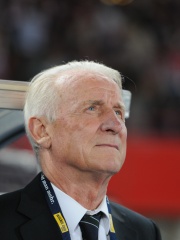
5. Giovanni Trapattoni (b. 1939)
With an HPI of 75.09, Giovanni Trapattoni is the 5th most famous Italian Coach. His biography has been translated into 49 different languages.
Giovanni Trapattoni (Italian pronunciation: [dʒoˈvanni trapatˈtoːni]; born 17 March 1939), popularly nicknamed "Trap" or "Il Trap", is an Italian former football manager and former player, considered the most successful club coach of Italian football. A former defensive midfielder, as a player he spent almost his entire club career with AC Milan, where he won two Serie A league titles (1961–62 and 1967–68), and two European Cups, in 1962–63 and 1968–69. Internationally, he played for Italy, earning 17 caps and being part of the squad at the 1962 FIFA World Cup in Chile. One of the most celebrated managers in football history, Trapattoni is one of only five coaches, alongside Carlo Ancelotti, Ernst Happel, Tomislav Ivić and José Mourinho, to have won league titles in four different European countries; in total, Trapattoni has won 10 league titles in Italy, Germany, Portugal and Austria. Alongside Udo Lattek and José Mourinho, he is one of the three coaches to have won all three major European club competitions (European Cup, UEFA Cup, UEFA Cup Winners' Cup) and the only one to achieve it with the same club (Juventus). Also, he is the only one to have won all official continental club competitions and the world title, achieving this with Juventus during his first spell with the club. He is one of the rare few to have won the European Cup, the Cup Winners' Cup and Intercontinental Cup as both a player and manager. Regarded as the most famous and consistent disciple of Nereo Rocco, Trapattoni coached his native Italy national team to the 2002 FIFA World Cup and UEFA Euro 2004, but could not replicate his club successes with Italy, suffering a controversial early exit in both competitions. Trapattoni was most recently the manager of the Republic of Ireland national football team. He led them to their first European Championships in 24 years, enjoying a successful UEFA Euro 2012 qualifying campaign. This followed narrowly missing out on the 2010 FIFA World Cup, after his team were controversially knocked out by France.

6. Marcello Lippi (b. 1948)
With an HPI of 74.05, Marcello Lippi is the 6th most famous Italian Coach. His biography has been translated into 56 different languages.
Marcello Romeo Lippi (Italian pronunciation: [marˈtʃɛllo ˈlippi]; born 12 April 1948) is an Italian former professional football player and former manager, who led the Italy national team to victory in the 2006 FIFA World Cup. He was appointed as Italy head coach in the summer of 2004 and 2008, and he was succeeded by Cesare Prandelli after a disappointing performance in the 2010 FIFA World Cup. Throughout his career as a manager, he won one World Cup, one UEFA Champions League, five Serie A titles, three Chinese Super League titles, one Coppa Italia, one Chinese FA Cup, four Italian Supercups, one AFC Champions League, one UEFA Super Cup and one Intercontinental Cup. Lippi is the first and to date the only coach to win both the UEFA Champions League and the AFC Champions League. He is also the first coach to have won the most prestigious international competitions both for clubs in different continents, and for national teams (the UEFA Champions League and the Intercontinental Cup in 1996 with Juventus; the AFC Champions League in 2013 with Guangzhou Evergrande; and the FIFA World Cup in 2006 with Italy). Lippi is regarded as one of the greatest and most successful managers in football history, and in 2007, The Times included him on its list of the top 50 managers of all time. He was named the world's best football manager by the International Federation of Football History & Statistics (IFFHS) both in 1996 and 1998 and the world's best National coach in 2006.

7. Arrigo Sacchi (b. 1946)
With an HPI of 72.75, Arrigo Sacchi is the 7th most famous Italian Coach. His biography has been translated into 38 different languages.
Arrigo Sacchi (born 1 April 1946) is an Italian former professional football coach, best known for having twice managed AC Milan. Sacchi is regarded as one of the greatest managers of all time, and his Milan side (1987–1991) is widely regarded to be one of the greatest club squads of all time. Sacchi won the Serie A title in his 1987–88 debut season and then dominated European football by winning back to back European Cups in 1989 and 1990. From 1991 to 1996, he was head coach of the Italy national team and led them to the 1994 FIFA World Cup final, where they lost to Brazil in a penalty shoot-out. Sacchi was never a professional football player and, for many years, worked as a shoe salesman. This led to his famous quote directed at those who questioned his qualifications: "I never realised that in order to become a jockey you have to have been a horse first." Another famous Sacchi quote is that "football is the most important of the least important things in life".

8. Luciano Spalletti (b. 1959)
With an HPI of 68.32, Luciano Spalletti is the 8th most famous Italian Coach. His biography has been translated into 45 different languages.
Luciano Spalletti (Italian pronunciation: [luˈtʃaːno spalˈletti]; born 7 March 1959) is an Italian football manager and former player who is the manager of Juventus. He started his managerial career with Empoli in 1993 before coaching clubs in Italy, including two spells with Roma, where he won two consecutive Coppa Italia titles. Spalletti managed Zenit St. Petersburg from 2009 to 2014, winning two Russian Premier League titles. Following two seasons in charge at Inter Milan, he was appointed manager of Napoli in 2021, where he won the Serie A in the 2022–23 season before leaving the club in June 2023. In August 2023, he was appointed as coach of the Italy national team and led the team to qualify for UEFA Euro 2024, where they were eliminated in the round of 16. He was sacked as Italy coach in June 2025. In October of that year, he returned to club management as head coach of Juventus.

9. Maurizio Sarri (b. 1959)
With an HPI of 68.09, Maurizio Sarri is the 9th most famous Italian Coach. His biography has been translated into 48 different languages.
Maurizio Sarri (Italian pronunciation: [mauˈrittsjo ˈsarri]; born 10 January 1959) is an Italian professional football manager who is currently manager of Serie A club Lazio. Sarri did not play football professionally, taking part as an amateur centre back and coach while working as a banker. In 2005, he had his first Serie B job at Pescara. In 2014, Sarri won promotion to Serie A with Empoli, and after preserving their place in the top flight he was hired by Napoli. He won several individual awards while managing the Naples-based club; after finishing as league runners-up in 2017–18, Sarri moved to English club Chelsea, where he won the UEFA Europa League in his only season with the club. He returned to Italy to coach Juventus in 2019, with whom he went on to win the Serie A title in his first season, becoming the oldest manager to win Serie A. After being sacked by Juventus, he was appointed manager of Lazio in 2021 before resigning in 2024. He returned as manager of Lazio in June 2025.
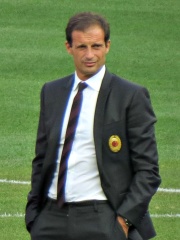
10. Massimiliano Allegri (b. 1967)
With an HPI of 67.29, Massimiliano Allegri is the 10th most famous Italian Coach. His biography has been translated into 52 different languages.
Massimiliano "Max" Allegri (Italian pronunciation: [massimiˈljaːno alˈleːɡri, -ˈlɛː-]; born 11 August 1967) is an Italian professional football manager and former professional player. He is currently manager of Serie A club AC Milan. During his playing career, Allegri played in the Serie A as a midfielder with Pisa, Pescara, Cagliari, Perugia and Napoli. In 2002, he won the Serie D title with Aglianese, with whom he retired as a player. During his time in Livorno, due to his lean body and quickness, he was referred to as "Acciughina" (Little Anchovy), a nickname the Italian press still uses to address him. After beginning his managerial career in 2003 with several smaller Italian sides, Allegri helped Sassuolo gain promotion to the Serie B for the first time in their history, winning the Serie C1 championship and Super Cup in the same year. From 2008 to 2010, he coached Cagliari in Serie A, leading them to their best Serie A finish in almost 15 years. His performances as head coach of Cagliari earned him a move to AC Milan in 2010, where he remained until January 2014; he won a Scudetto in 2010–11, Milan's first since 2004, and a Supercoppa Italiana title in 2011. Between 2014 and 2019, Allegri was in charge of Juventus, with whom he won eleven trophies: five consecutive league titles (from 2015 to 2019), four Coppa Italia titles in a row (from 2015 to 2018) and two Supercoppa Italiana titles (2015 and 2018); he also reached two UEFA Champions League finals (2015 and 2017). He returned to Juventus in 2021, following two years away from management. In his second period at the club, he won another Coppa Italia in 2024, but was sacked only a couple days later, largely due to his behaviour during and after the final, which the club deemed incompatible with its values. He returned as manager of AC Milan in May 2025. Individually, Allegri won the Panchina d'Oro (Golden Bench) four times (2009, 2015, 2017 and 2018) and was four times Serie A Coach of the Year (2011, 2015, 2016 and 2018), as well as being awarded the Enzo Bearzot Award (2015) and inducted into the Italian Football Hall of Fame (2018). He is also the only coach in Italian football history to have won five Scudetti and four Coppa Italia titles consecutively, and the only one in Europe's top five leagues to have won a domestic double for four consecutive seasons.
People
Pantheon has 40 people classified as Italian coaches born between 1911 and 1979. Of these 40, 35 (87.50%) of them are still alive today. The most famous living Italian coaches include Carlo Ancelotti, Dino Zoff, and Fabio Capello. The most famous deceased Italian coaches include Enzo Bearzot, Sergio Bertoni, and Annibale Frossi. As of April 2024, 1 new Italian coaches have been added to Pantheon including Andrea Trinchieri.
Living Italian Coaches
Go to all RankingsCarlo Ancelotti
1959 - Present
HPI: 81.23
Dino Zoff
1942 - Present
HPI: 76.82
Fabio Capello
1946 - Present
HPI: 76.04
Claudio Ranieri
1951 - Present
HPI: 76.00
Giovanni Trapattoni
1939 - Present
HPI: 75.09
Marcello Lippi
1948 - Present
HPI: 74.05
Arrigo Sacchi
1946 - Present
HPI: 72.75
Luciano Spalletti
1959 - Present
HPI: 68.32
Maurizio Sarri
1959 - Present
HPI: 68.09
Massimiliano Allegri
1967 - Present
HPI: 67.29
Alberto Zaccheroni
1953 - Present
HPI: 65.51
Stefano Pioli
1965 - Present
HPI: 65.50
Deceased Italian Coaches
Go to all RankingsEnzo Bearzot
1927 - 2010
HPI: 67.19
Sergio Bertoni
1915 - 1995
HPI: 61.07
Annibale Frossi
1911 - 1999
HPI: 57.25
Ezio Pascutti
1937 - 2017
HPI: 55.87
Italo Galbiati
1937 - 2023
HPI: 52.94
Newly Added Italian Coaches (2025)
Go to all RankingsOverlapping Lives
Which Coaches were alive at the same time? This visualization shows the lifespans of the 5 most globally memorable Coaches since 1700.

